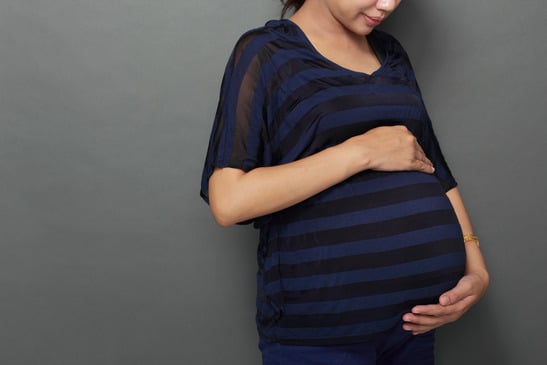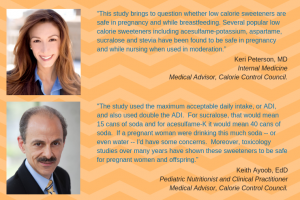
A Statement from the Calorie Control Council
June 28, 2019 – Results of an animal study published in the journal Frontiers in Microbiology and entitled Maternal Exposure to Non-Nutritive Sweeteners Impacts Progeny’s Metabolism and Microbiome cannot be extrapolated to humans. The study involved mice as test subjects, which were fed one of three formulas: a mixture of sucralose and acesulfame-potassium (Ace-K) equivalent to the upper limit of the allowable daily intake (ADI) for human consumption; a mixture equivalent to twice the ADI; or water. For context, twice the ADI for sucralose and Ace-K would be the equivalent of a 150lb human consuming 46 packets of both sweeteners each, in one day. For both intervention groups, the authors report the presence of non-nutritive sweeteners (NNS) in the mothers’ blood and feces. NNS were detected at either low concentrations or were not measurable in the mice pups’ blood and feces as compared to their mother. Alterations were also reported in “microbiome-linked metabolites, amino acid metabolism and detoxification pathways” in the pups, as well as “major changes” in the gut microbiota.
While additional research in this area is warranted, it is important that conclusions drawn from such studies are done so responsibly and within the proper context. First, the results of animal studies, while helpful in planning for future human clinical trials, cannot be extrapolated to humans. For example, in the current study, a dose-dependent effect was reported with a greater degree of metabolic change noted in the group receiving doses at twice the ADI. Without further study in real-world settings, including dosing to mimic typical intake and the consideration of the total diet and lifestyle factors, such findings should be interpreted with caution.

The current study also reports “drastic” changes in the microbiome of these pups, and that similar alteration in humans have been linked to type 2 diabetes and obesity. Research in this area is inconsistent and little is known regarding the long-term impact of such changes. Most of the studies are observational and are therefore unable to establish causality, isolate the effect of NNS from other factors or definitively attribute changes in the gut microbiota to specific health outcomes.
It is important to note that the U.S. Food and Drug Administration, as well as global scientific authorities such as the European Food Safety Authority, have declared the safety of both Ace-K and sucralose for human consumption, including in vulnerable populations such as children, the elderly and pregnant women. Further, though there is evidence of small amounts of Ace-K passing into breastmilk, Ace-K is safe to consume in moderation when breastfeeding. Given that sucralose is poorly absorbed in the gastrointestinal tract and excreted unchanged through urine, it is considered safe for lactating mothers.


